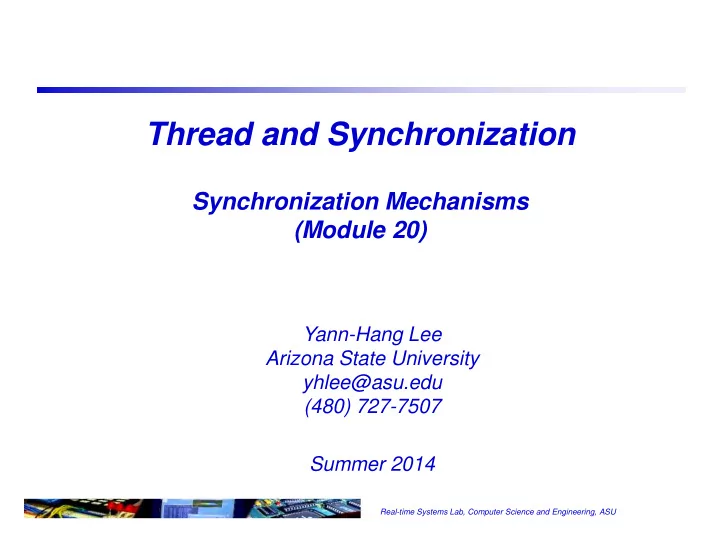

Thread and Synchronization Synchronization Mechanisms (Module 20) Yann-Hang Lee Arizona State University yhlee@asu.edu (480) 727-7507 Summer 2014 Real-time Systems Lab, Computer Science and Engineering, ASU
Thread Synchronization -- Semaphore creating a semaphore: int sem_init(sem_t *sem, int pshared, unsigned int value); initializes a semaphore object pointed to by sem pshared is a sharing option; a value of 0 means the semaphore is local to the calling process gives an initial value to the semaphore terminating a semaphore: int sem_destroy(sem_t *sem); semaphore control: int sem_post(sem_t *sem); int sem_wait(sem_t *sem); sem_post atomically increases the value of a semaphore by 1, sem_wait atomically decreases the value of a semaphore by 1; but always waits until the semaphore has a non-zero value first 1 Real-time Systems Lab, Computer Science and Engineering, ASU
Example: Semaphore #include <pthread.h> #include <semaphore.h> sem_t semaphore; // also a global variable just like mutexes int main() { int tmp; tmp = sem_init( &semaphore, 0, 0 ); // initialize the semaphore pthread_create( &thread[i], NULL, thread_function, NULL ); // create threads while ( still_has_something_to_do() ) { sem_post( &semaphore ); void *thread_function( void *arg ) { ... } sem_wait( &semaphore ); pthread_join( thread[i], NULL ); perform_task(); sem_destroy( &semaphore ); pthread_exit( NULL ); return 0; } } 2 Real-time Systems Lab, Computer Science and Engineering, ASU
Condition Variables A variable of type pthread_cond_t Use condition variables to atomically block threads until a particular condition is true. Always use condition variables together with a mutex lock. pthread_mutex_lock(); while( condition_is_false ) pthread_cond_wait(); pthread_mutex_unlock(); Use pthread_cond_wait() to atomically release the mutex and to cause the calling thread to block on the condition variable The blocked thread can be awakened by pthread_cond_signal(), pthread_cond_broadcast(), or when interrupted by delivery of a signal. 3 Real-time Systems Lab, Computer Science and Engineering, ASU
Atomic Operations Atomic operations provide instructions that are executable atomically; without interruption Not possible for two atomic operations by a single CPU to occur concurrently Atomic 80x86 instructions Instructions that make zero or one aligned memory access Read-modify-write instructions (inc or dec) Read-modify-write instructions whose opcode is prefixed by the lock byte (0xf0) In RISC, load-link/store conditional (ldrex/strex) store can succeed only if no updates have occurred to that location since the load-link. Linux kernel two sets of interfaces for atomic operations: one for integers and another for individual bits 4 Real-time Systems Lab, Computer Science and Engineering, ASU
Linux Atomic Operations Uses atomic_t data type Atomic operations on integer counter in Linux Function Description atomic_read(v) Return *v atomic_set(v,i) set *v to i atomic_add(i,v) add i to *v atomic_sub(i,v) subtract i from *v atomic_sub_and_test(i,v) subtract i from *v and return 1 if result is 0 atomic_inc(v) add 1 to *v atomic_dec(v) subtract 1 from *v atomic_dec_and_test(v) subtract 1 from *v and return 1 if result is 0 atomic_inc_and_test(v) add 1 to *v and return 1 if result is 0 atomic_add_negative(i,v) add i to *v and return 1 if result is negative A counter to be incremented by multiple threads Atomic operate at the bit level, such as unsigned long word = 0; set_bit(0, &word); /* bit zero is now set (atomically) */ 5 Real-time Systems Lab, Computer Science and Engineering, ASU
Spinlock Ensuring mutual exclusion using a busy-wait lock. if the lock is available, it is taken, the mutually-exclusive action is performed, and then the lock is released. If the lock is not available, the thread busy-waits on the lock until it is available. it keeps spinning, thus wasting the processor time If the waiting duration is short, faster than putting the thread to sleep and then waking it up later when the lock is available. really only useful in SMP systems Spinlock with local CPU interrupt disable spin_lock_irqsave( &my_spinlock, flags ); // critical section spin_unlock_irqrestore( &my_spinlock, flags ); Reader/writer spinlock – allows multiple readers with no writer 6 Real-time Systems Lab, Computer Science and Engineering, ASU
SpinLock static inline void spin_lock(spinlock_t *lock) is defined in spinlock_api_up.h spinlock_api_smp.h For up, #define _raw_spin_lock(lock) __LOCK(lock) #define __LOCK(lock) preempt_disable(); ___LOCK(lock); #define ___LOCK(lock) __acquire(lock); (void)(lock); #define __acquire(x) (void)0 // noop #define preempt_disable() barrier() spin_lock_irqsave(lock, flags) → f = arch_local_save_flags(); arch_local_irq_disable(); 7 Real-time Systems Lab, Computer Science and Engineering, ASU
Recommend
More recommend